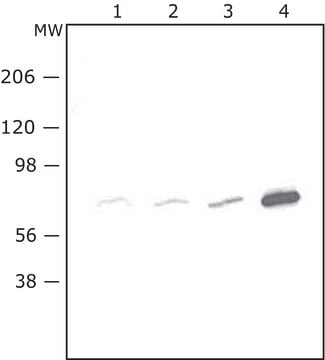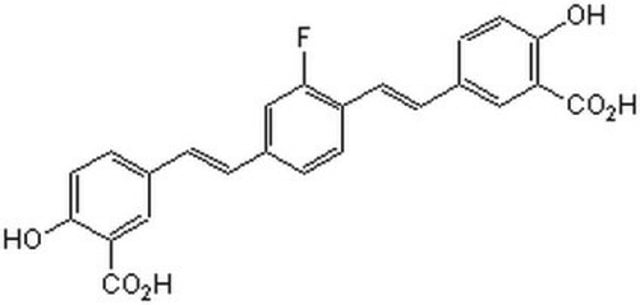P0497
Anti-PMP70 antibody produced in rabbit

affinity isolated antibody, buffered aqueous solution
Synonyme(s) :
Anti-70 kDa Peroxisomal membrane Protein, Anti-ABCD3, Anti-PXMP1
About This Item
Produits recommandés
Source biologique
rabbit
Conjugué
unconjugated
Forme d'anticorps
affinity isolated antibody
Type de produit anticorps
primary antibodies
Clone
polyclonal
Forme
buffered aqueous solution
Poids mol.
antigen 70 kDa
Espèces réactives
human, mouse, rat
Validation améliorée
independent
Learn more about Antibody Enhanced Validation
Technique(s)
immunoprecipitation (IP): 1-2 μg using RIPA extract (0.5 mg) from human HepG2 cells
indirect immunofluorescence: 4-8 μg/mL using mouse NIH3T3 cells
western blot (chemiluminescent): 0.5-1 μg/mL using whole extracts of rat PC12 cells or rat kidney extract or rat liver extract
Numéro d'accès UniProt
Conditions d'expédition
dry ice
Température de stockage
−20°C
Modification post-traductionnelle de la cible
unmodified
Informations sur le gène
human ... ABCD3(5825)
mouse ... Abcd3(19299)
rat ... Abcd3(25270)
Description générale
Immunogène
Application
- immunocytochemistry
- immunostaining
- immunofluorescence
- western blotting
- immunoprecipitation
Actions biochimiques/physiologiques
Forme physique
Clause de non-responsabilité
Vous ne trouvez pas le bon produit ?
Essayez notre Outil de sélection de produits.
Produit(s) apparenté(s)
Code de la classe de stockage
10 - Combustible liquids
Classe de danger pour l'eau (WGK)
nwg
Point d'éclair (°F)
Not applicable
Point d'éclair (°C)
Not applicable
Certificats d'analyse (COA)
Recherchez un Certificats d'analyse (COA) en saisissant le numéro de lot du produit. Les numéros de lot figurent sur l'étiquette du produit après les mots "Lot" ou "Batch".
Déjà en possession de ce produit ?
Retrouvez la documentation relative aux produits que vous avez récemment achetés dans la Bibliothèque de documents.
Articles
Centrifugation separates organelles based on size, shape, and density, facilitating subcellular fractionation across various samples.
Centrifugation separates organelles based on size, shape, and density, facilitating subcellular fractionation across various samples.
Centrifugation separates organelles based on size, shape, and density, facilitating subcellular fractionation across various samples.
Centrifugation separates organelles based on size, shape, and density, facilitating subcellular fractionation across various samples.
Notre équipe de scientifiques dispose d'une expérience dans tous les secteurs de la recherche, notamment en sciences de la vie, science des matériaux, synthèse chimique, chromatographie, analyse et dans de nombreux autres domaines..
Contacter notre Service technique







